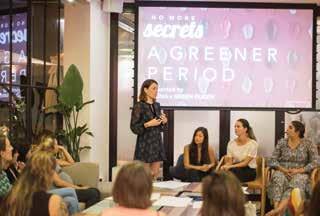
9 minute read
Seeing Red
A FLOW ON EFFECT: MEET THE WOMEN CHANGING HOW WE TALK ABOUT PERIODS IN ASIA
Periods. Between the ages of around 12 and 50, half the world’s population will spend roughly five days a month menstruating. They’re experienced by so many, but for some reason society prefers to pretend periods don’t exist, speaking about them in hushed tones and outdated euphemisms. And with so many of us having experienced period-related shame or embarrasment, it’s high time that something changed. Thankfully, the conversation about periods is slowly starting to shift and emerge into public consciousness, in large part due to vocal advocates of change who are standing up and speaking out about menstruation. We speak to three period pioneers working to reclaim our time of the month and change how we talk about menses in Asia. By Carla Thomas
Advertisement
OLIVIA COTESJAMES,
29, Founder of LUÜNA Naturals

LUÜNA naturals is a social impact feminine hygiene company that sells all-natural period products like organic tampons, pads and reusable menstrual cups. Born in New Zealand and raised in the UK, Olivia Cotes-James founded the startup in 2015 as a means to help educate and provide safer period care for women in Asia.
Q: How did you get the idea for LUÜNA naturals?
In late 2015, I was feeling frustrated at having to bring large supplies of tampons back to Hong Kong every time I visited the UK. The brand I liked wasn’t available in a lot of stores here and moreover, it was more expensive than I was used to paying. Many women living in Hong Kong still do this today.
In order to understand why access to basic period care was limited in a modern city like Hong Kong, I began research into attitudes towards menstrual health. It was through this research that I came to understand the myriad negative consequences of the traditional feminine care industry; its uninspiring branding, shameful advertising and use of toxic ingredients. I learned these dangerous materials are used in the tampons I’d been putting in my body for almost a decade. Crucially, when I stopped using them, the yeast infections and discomfort I’d suffered for years during my period stopped. I knew that I had to create the period care company that myself and all women deserve: one that values transparency, ethics and purpose.
Q: How important are organic period products? What are the possible risks to women?
In the last five years of research, over 90 percent of people I’ve interviewed have been unable to tell me what traditional period products are made of, despite the millions of us who use them on a regular basis. They’re shocked to discover that big-brand tampons and pads contain a combination of conventional cotton, which is grown with carcinogenic chemicals, and synthetics like viscose and polyester. Not only do these materials cause irreparable environmental damage, they are increasingly linked to chronic health issues in women, such as endocrine hormone disruption and endometriosis, which can result in debilitating symptoms and infertility.
Long-term health issues aside, it is these materials that actually cause the negative tangible symptoms many of us experience on a monthly basis. Periods are not inherently sticky, smelly, unhygienic or unpleasant. Our negative view of menstruation can be traced in many ways back to the poor quality products we’ve been sold for decades, not menstruation itself.
Q: Why was it important to make LUÜNA a social impact business, instead of just selling all-natural period care products?
We believe deeply in the notion of sisterhood and that every time we choose better period care for ourselves, we can advance the situation of someone from a more vulnerable group. As such, we established the LUÜNA Period Collective, a network of social impact partners across the world through which we can responsibly donate period products and menstrual health workshops to those in need.
Q: What kind of impact has LUÜNA naturals been able to make so far?
We have been able to stop 3 million plastic pads and tampons reaching landfills and the ocean through sales and donations of period cups. We have donated over 30,000 organic pads to vulnerable groups affected by COVID-19 through our A BETTER PERIOD initiative, and we’re on the way to having 250 companies and organisations stock our products for free in their venues across Asia. We’ve also given over 500 period health workshops in English, Cantonese and Mandarin.
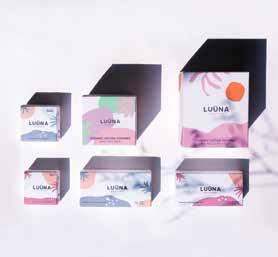
BIDHYA SHRESTHA,
23, Chairperson of Aama Ko Koseli
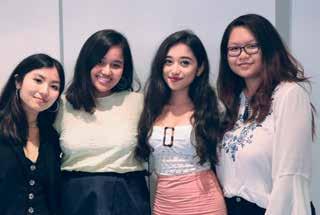
Aama Ko Koseli is a Hong Kong nonprofit organisation addressing gender issues in marginalised communities. In 2019, they visited western Nepal to raise menstrual awareness and provide safe reusable pads to rural women. While there, they filmed a documentary, “Project Untouchable Goddesses” which examined the Nepalese practice of chhaupadi (solitary confinement during menstruation).
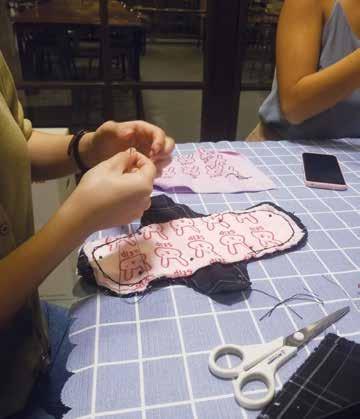
Q: What different needs do the South Asian female community in Hong Kong have compared to other ethnic backgrounds?
I think that oftentimes when we think about gender issues, we see it from a homogenous perspective. However, we fail to understand that there are diverse cultural aspects that make the experience of misogyny and inequality different for South Asian women. In the context of Hong Kong’s social policies, I feel that there can be a lack of sensitivity to the cultural differences for ethnic minorities, for example, anti-domestic violence strategies that fail to provide compassionate housing or other basic needs.
Q: How does menstruation tie into human empowerment, and does that affect communities of colour differently?
Menstruation has always been a human rights issue to me because it affects everyone: women, trans men or other non-binary individuals who also menstruate. Period poverty and stigma hinder the progress of menstruators, particularly in economic and educational mobility. In the context of Nepal, there is also a negative stigma around periods, which regards them as impure and dirty.
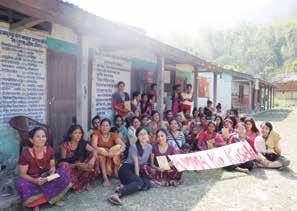
Q: What misconceptions are there about South Asian rural communities? What do you think could be done to better serve those communities?
Instead of assuming that we need to “rescue” rural women from their problems, we need to adopt an approach that does not assume they need saviours. The misconception victimises rural women and does not really cater to their needs, but rather what we think they need. What I realised [during our 2019 trip] is that these women are well aware of menstrual hygiene, but the only issue was that they did not have access to these menstrual products.
I think it is important to first listen to what they need and then to find sustainable solutions that work long term for them. For this reason, we provided reusable pads instead of disposable ones.
Q: What kinds of reactions have you received working in menstrual health awareness?
The response that we have received has been really positive so far. In the village, we had spoken with both girls and boys in schools as well as adult men and women. They were all very enthusiastic and eager to learn more about menstrual hygiene. The adults were also very insightful in giving their reasons for supporting the tradition of chhaupadi and appreciated the organisation’s reusable pads.
Similarly, in Hong Kong, it was a great experience just talking about period experiences and health issues with women at our workshops; it definitely gives us the space to talk about something that we don’t communicate enough about in society.
JOYCE FUNG,
25, founder of MenstruAction
MenstruAction is a social media project aimed at dismantling taboos and stigmas around menstruation in traditional Chinese culture. Founded by Joyce Fung as a part of her capstone coursework at University of Hong Kong in 2017, today the platform promotes “period-positivity” through social campaigns, workshops, fundraisers and research.
Q: What are some examples of menstrual stigma specific to Chinese culture, and how is this potentially harmful to young women?
The almost universal menstrual stigma is always about the idea that menstrual blood is unclean and impure - even more so than other bodily fluids - and hence a menstruating person is also unclean and impure. In a Hong Kong or Chinese context, and actually in many other religious traditions as well, a menstruating individual supposedly cannot enter a temple and worship because it would be seen as a disrespect to the deities. It is also widely believed that it would bring bad luck to men if they touch menstrual pads. Some protestors even joked about using menstrual pads as a defence during the social movements last year.
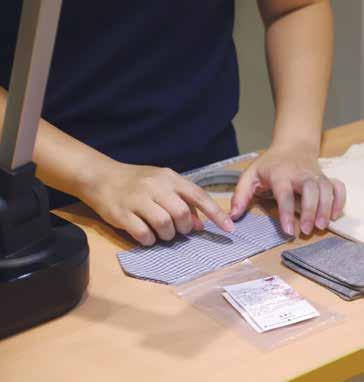
The most harmful thing about menstrual stigma is the internalised idea of shame. Nothing hurts more than thinking you’re unclean and impure. And this idea of shame and impurity adversely affect one’s self-esteem and body image. It limits our imagination of what we can be and our choices in life.
Q: Explain what “period-positive” means.
Being “period-positive” is to learn about menstruation, including the anatomy, the menstrual cycle, the menovulatory lifetime, the different menstrual products, and to talk about it and not be ashamed. To recognise the existence of menstrual taboo ingrained in our society and the importance of changing it, to be aware of the issue of gender inclusivity and acknowledge that not only women menstruate. If you are in charge of a company, a school, or something bigger, make sure your staff and students have sufficient menstrual supplies, and make sure that when they need to take menstrual leave they are heard and respected.
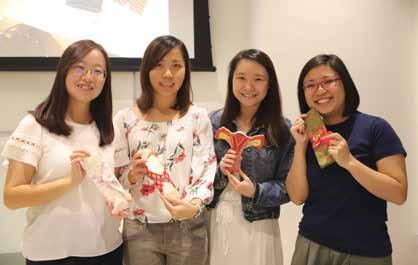

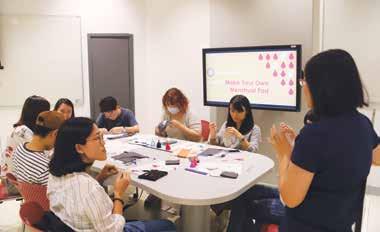
Q: Is there enough research being done on menstruation and its effects on women’s health? What are the possible implications of this for women?
In terms of research, there will never be enough. In our society there’s this idea that menstruation and menstrual disorders are dismissed as not a serious problem, and that’s partly why it takes so long for patients to get diagnosed with disorders like endometriosis. All of us, including menstruators, employers, teachers, parents and doctors, need to take menstrual pain and menstrual disorders seriously. Be educated and educate others about it, because it has huge implications for health in general.
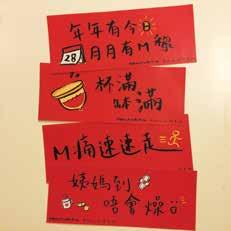
Q: What’s the best way to start a conversation about periods? How can women help normalize menstruation in their own communities/circle of friends and family?
As natural as menstruation is, the conversation about it should be in our everyday lives and there is no better time to start conversing about it than when you’re on your period! I make sure my friends and family know when I am on my period, and they realise that I may be a little more drained and grumpy. If you want to talk about periods, start by opening up about it with your close circle of friends and family.










